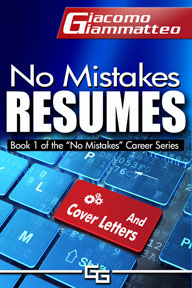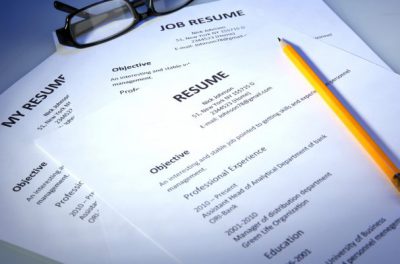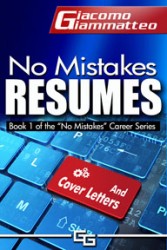Resume Mistakes Can Kill Your Chance For An Interview
Scoring an interview is difficult, but a lot of people make it tougher by presenting an inferior resume. A good job posting typically draws at least 100 resumes, and quite often as many as 300–500. In mid- to large-sized companies, a significant number of resumes are screened by ATS and are never seen my human eyes. That means your resume is up against heavy competition. One way to gain an edge is to ensure your resume has no mistakes.
*So let’s take a look at the 10 worst resume mistakes, starting with number 10.
10—Objectives
No matter what your objective says, unless it meets the vision this particular company has for the position, you have potentially screened yourself out.
A good objective—even a perfect objective—won’t compensate for lack of experience, weak accomplishments, an unstable work history, or inappropriate education. A good objective may get you a nod of the gatekeeper’s head, and keep her reading for a few more lines, but she’ll do that without an objective too.
The bottom line is that leaving an objective off your resume will offend no one. No one will second guess you. No one will toss your resume into the trash can. Even though an objective can seem like a good thing, it’s not, which is why it qualifies as one of the 10 worst resume mistakes. You can read more about objectives in this post.
9—Summaries
A summary is nothing more than you telling the gatekeeper that you are superman, or superwoman, but telling does no good—you have to show them you’re the right person for the job with accomplishments.
8—Hobbies
Do not put your hobbies on the resume. Even if you have a black belt in a martial art, or run marathons, or are an expert photographer. Even if you played baseball for a minor league team. I don’t care about it, and neither will the gatekeeper.
If you really, really, really feel it’s relevant to the job you’re applying for, you can include it in your cover letter. And yes, you should have a cover letter.
 7—Personal
7—Personal
A resume is not a place to share personal information. I don’t want to know your spouse’s name. Or what religion you are, or that your son’s name is Kip. I don’t need to know that you have a Siamese or Burmese cat, or even a Bernese Mountain Dog. And I certainly don’t need to know if you like Béarnaise sauce, unless you’re applying for a chef’s position.
And as much as I love dogs, I don’t need to know what his, or her, name is either.
A resume is all about the employer. It has nothing to do with you. Maybe after you get the job it will be important, but for now it’s irrelevant and will do more harm than good.
6—Religion
Do not put your religious beliefs, or anything else about religion on your resume. Don’t put it in your cover letter either. It can come to no good.
5—Keyword Stuffing
ATS are improving all the time. They not only recognize keywords but the ones based on newer technology are excellent at semantic search, which improves screening accuracy by taking into account not just keywords, but the contextual meaning of words and terms on the resume.
This gives a whole new meaning to keywords, and the new machines can analyze whether you are stuffing your resume or whether your experience is truly a match for the position. That is a big reason for strategically using your keywords in the accomplishments section instead of a mass listing in a summary or skills section. Here’s a link to another post on keywords and ATS.
4—Dates: Don’t Leave the Months Off
You should always list the months you worked—not just years.

Many resumes list years only, not months. I know a lot of that comes from bad advice, and I hope that’s the primary reason. But in case you’re still thinking about it, read the statement below.
Then read it again.
If you don’t put months on your dates of employment, you are guilty until proven innocent.
Every gatekeeper and every headhunter I know gets suspicious when they see only years listed on a resume. If your resume shows 1997–2001, and then 2001 to present, the first thing I think is, “Did they leave in January 2001 and start the other job the following December?†It might be wrong to think like that, but it’s a fact of life that gatekeepers do. If you don’t put the months down, you’re assumed guilty. Period. End of discussion. Resume trashed. If you want more material on this subject, check out this post.
3—Responsibilities
Responsibilities take up a huge part of most resumes, and that’s unfortunate. I say unfortunate, because the space most people devote to responsibilities could be used much more effectively.
If you have a compelling reason to list responsibilities, follow these few rules:
- Keep it simple.
- Keep it short.
- Keep it relevant.
The only reason to even list responsibilities is to give the gatekeeper a sense of what your job involves, because it tells them nothing else. You can be responsible for anything, but it doesn’t mean you did it well. My teenage son was responsible for keeping his room clean. Need I say more?
If you feel you absolutely have to include a few responsibilities on your resume, focus only on the key ones, the ones relevant to the job you’re considering. Leave the insignificant ones off. You’ll dilute your message and have less impact if you include minor things with big ones.
If you take a person’s listing of their responsibilities at face value, they can appear impressive. A person can say that they were responsible for launching twenty products, but if they didn’t launch any successfully, what good did that do?
The problem with resumes is that gatekeepers can’t interpret results by looking at a piece of paper, so candidates must provide gatekeepers with a way to get something meaningful from the resume. Responsibilities are not the way to do that—accomplishments are.
2—Lying
Lying has no place in the resume, and resumes are where the lies usually rear their ugly heads, especially about dates. I’ve seen people leave out jobs, leave off dates, fudge dates, and outright lie about dates. Besides being just not right, when you lie about dates, it’s too easy to get caught.
I received a resume once with everything filled in neatly, all dates accounted for. I did some checking on Linked-in to see who else I knew that might have worked with this person, and I saw a recommendation from a person who said “worked with Bob at XYZ Company.†I was puzzled. Bob’s resume didn’t show employment at XYZ Company. I did some digging, and, sure enough, Bob was at XYZ for about six months. He just “forgot†to mention it on his resume.
Needless to say, I didn’t represent Bob. The sad thing is—and I checked this—his tenure at XYZ wasn’t bad. He didn’t get fired. He did nothing wrong. It was just one of those circumstances that didn’t work out. Perfectly explainable to a prospective employer. Instead, Bob chose to hide it, and it cost him a shot at a good job.
Never lie about anything. Don’t even exaggerate. If you increased sales by 17%, don’t say it was 20%. If you worked somewhere for five months, don’t leave it off the resume. And don’t even think of faking a degree.
1—Accomplishments
It’s time to put the finishing touches on the perfect resume. Accomplishments are the heart of the resume. That section is the only one that can actually help get you in the door; it’s imperative that you make this area shine.
For those of you who like to think in sports terms, consider this: everything else on your resume is like playing defense; the only offense you have are your accomplishments. (And your cover letter.)
There are a few key things you can’t afford to forget:
- Tailor your accomplishments to the job description
- Make sure you know what the company is looking for and list the accomplishments that are relevant.
- Get specific. Don’t say, “Brought project in ahead of schedule and under budget.†Instead, say,
- Brought project in six weeks ahead of schedule and 12% under budget, saving the company $2.35 million.
- If you can, match keywords from the job description to your accomplishments, but only if it seems natural. Avoid any attempt at keyword stuffing.
Bottom Line

Accomplishments are the key to success. Make sure you tailor your resume to the job description for each job you apply for. And make sure that you include details like percentages, numbers, dollars.
Remember, your resume has to speak for you, so make it as impressive as you can without stretching the truth.
If you enjoyed this post, please share.
Jim (Giacomo) Giammatteo is a headhunter who writes resumes and cover letters. He is the author of No Mistakes Resumes, and No Mistakes Interviews. He also writes gritty crime dramas about murder, mystery, and family.
He lives in Texas where he and his wife have an animal sanctuary with 45 loving “friends.â€
photo credit: La Tête Krançien via photo pin cc
photo credit: PIX-JOCKEY via photo pin cc
photo credit: WarzauWynn via photopin cc



























Connect
Connect with us on the following social media platforms.